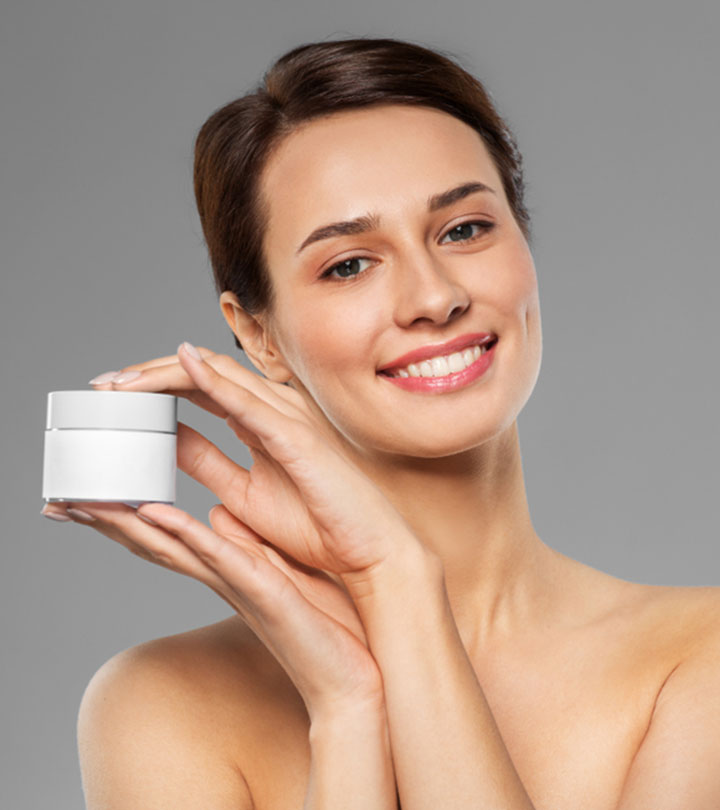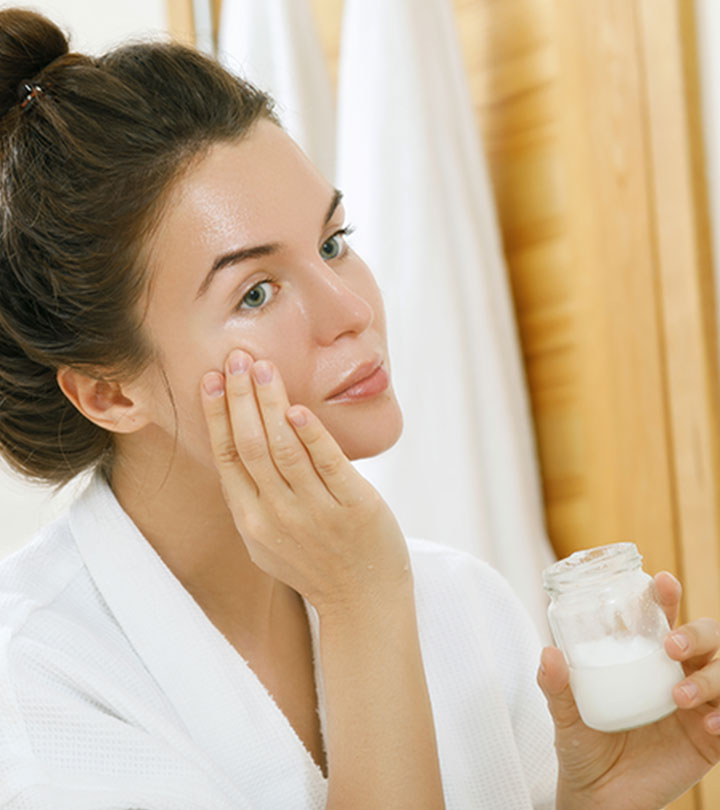You must have noticed cetearyl alcohol in many skin care products? But, is cetearyl alcohol for the skin considered safe? Short-chain alcohols like ethanol and propanol are commonly used in skin care products to help the other components blend effectively. But they may cause skin irritation and loss of moisture by disrupting the skin’s natural barrier.
Cetearyl alcohol is a safer option. It is found in many skin care products and is good for dry skin. Fatty alcohols like cetearyl acid help maintain the moisture in the skin.
In this article, we delve deeper into the benefits of cetearyl alcohol for the skin. Keep reading!
In This Article
What Is Cetearyl Alcohol?
Cetearyl alcohol is a fatty alcohol used actively in skincare and other cosmetic formulations to improve the thickness, texture, and sensory feel of products. This ingredient also helps soften the skin (1).
It is also known as cetostearyl alcohol. It is basically a mixture of fatty alcohols, primarily cetyl and stearyl alcohols. While cetyl alcohol is derived from palm oil, stearyl alcohol is derived from stearic acid, a saturated fatty acid.
Did You Know? In cetearyl alcohol, the alcohol group (-OH) is attached to a very long chain of hydrocarbons. It allows fatty alcohols to trap water and provides a soothing feel to the skin.
Cetearyl alcohol is a white, waxy solid, usually available in a flake form. It is easily soluble in alcohol but insoluble in water. It is a popular ingredient with multiple skin benefits. We have discussed the same below.
Benefits Of Cetearyl Alcohol For Skin
Shutterstock
Cetearyl alcohol acts as a base for many skincare products. It also helps nourish your skin. Following are the other benefits of cetearyl alcohol.
1. Acts As An Emulsifier
An emulsifier is included in products containing water and oil components. Oil- and water-based ingredients do not stay mixed in a formulation for long. An emulsifier like cetearyl alcohol keeps these two types of ingredients dispersed and produces a stable emulsion (2).
It acts as an important binding agent for oil and water in skincare products.
How Does It Benefit Skin?
As an emulsifier, cetearyl alcohol prevents the separation of skincare products. Hence, these products do not separate when applied cosmetically too. This property boosts the product’s effectiveness.
2. Acts As An Emollient
Emollients are occlusive ingredients that form a protective layer on the skin and prevent water loss. Cetearyl alcohol is an emollient that improves the texture and spreadability of the product and offers the skin a protective barrier.
It also helps moisturize and soften the skin. It seals skin moisture.
How Does It Benefit Skin?
The emollient properties of cetearyl alcohol may help soften and smoothen the skin. However, more research is warranted in this regard.
3. Acts As A Product Thickener
Cetearyl alcohol also works as a viscosity-enhancing agent. It helps thicken various skin formulations and makes a product less runny, safe to use, and easier to spread.
How Does It Benefit Skin?
Cetearyl alcohol helps enhance the texture and feel of products, making them more effective on your skin.
Cetearyl alcohol is often confused with regular sensitizing alcohol used commonly in skin care products. However, they are quite different.
Cetearyl Alcohol Vs. Sensitizing Alcohols – The Difference?
Shutterstock
Cetearyl alcohol is not the same as traditional alcohols known for drying, irritating, and sensitizing the skin. Alcohol, in general, refers to a chemical with an -OH group. It does not necessarily mean that alcohol is bad for your skin.
In cetearyl alcohol, this alcohol group is attached to a long chain of fats that help balance it out. Hence, it is less harsh on your skin and acts as an emollient.
Sensitizing alcohols don’t usually contain this long chain of fats to balance out the drying properties of alcohol. Hence, they tend to dry the skin out.
While cetearyl alcohol is safer than regular alcohols, it also may cause certain side effects. We have discussed the same below.
Side Effects Of Cetearyl Alcohol
Shutterstock
Cetearyl alcohol is safe to use in cosmetic products and is generally considered a non-irritating ingredient. However, certain individuals had developed allergic contact dermatitis following the use of cetearyl alcohol (3). This ingredient is also known to cause allergies in those with leg ulcers (4).
But the incidences of these allergies are very rare, as cetearyl alcohol-based products, like shampoos, conditioners, cleansers, etc., get rinsed off easily. They do not come in contact with the skin for a prolonged period.
That said, if you have sensitive skin or are prone to skin allergies, it is recommended to exercise caution before using products containing cetearyl alcohol. You may do a patch test or even consult your doctor regarding the same.
Should cetearyl alcohol suit you, here’s how you can use it.
How To Use Cetearyl Alcohol In Skin Care
Shutterstock
Since cetearyl alcohol is found in a variety of skincare products, including moisturizers and hair conditioners, there are no fixed guidelines for its use.
In general, incorporating it into your skincare routine is simple. Here is how you can do it:
- Cleanse Your Face Thoroughly
Start by cleansing your face thoroughly with a natural cleanser that does not dry your skin out.
Related: 8 Natural Cleansers For Clear Skin
- Use A Hydrating Toner
Follow with a hydrating toner that seals your skin moisture.
Related: Face Toner For Skin: Benefits, How To Apply, & When To Use
- Apply A Good Brightening Serum
Follow with a good, brightening serum rich in vitamin C that restores your skin’s natural glow. Vitamin C also helps diminish fine lines and wrinkles.
- Use A Moisturizer With Cetearyl Alcohol
Use a moisturizer with cetearyl alcohol. This deeply moisturizes and softens your skin. Ensure you follow with an eye cream with cetearyl alcohol to protect the delicate skin around your eyes.
- Detox With A Good Face Mask
Apply a high-quality face mask once a week (such as a detoxifying charcoal mask)that not only draws out skin impurities but also nourishes your skin.
Additionally, remember to use these products as directed. Some cetearyl alcohol-based products need priming while others need to be shaken well before use. Read the instructions carefully.
While cetearyl alcohol is generally safe, it cannot be used by all. Keep reading to know more.
Related: 16 Simple Homemade Face Masks For Glowing Skin
Who Should Not Use It?
Shutterstock
Anyone with sensitive skin should avoid using cetearyl alcohol-based products, especially around the eyes, inside the mouth/nose, and on the vaginal area. Those allergic to cetyl or stearyl must also avoid products containing these ingredients.
Check the product label for directions. Certain products are not supposed to be applied to the face, recently shaved areas, and other areas with broken/cut/irritated/chapped/scraped skin.
If you develop irritation or swelling after using a cetearyl alcohol-based product, stop use and switch to another product. Seek immediate medical attention if your condition persists or worsens.
StyleCraze Says Since cetearyl alcohol is a fatty alcohol, you may find this ingredient in cosmetic products labeled as ‘alcohol-free.’
Infographic: Precautions To Take While Using Cetearyl Alcohol
Cetearyl alcohol is a skin care ingredient that improves the products’ thickness, sensory feel, and texture. Though it is safe to use, there are certain precautions you need to take while using this ingredient to avoid allergic reactions or irritation.
Check out the infographic below to know the necessary precautions to follow while using cetearyl alcohol with your skin care products.
Cetearyl alcohol is one of the best options if you have dry skin. You may use products with cetearyl alcohols as it provides good texture and thickness to your products. It acts as an emulsifier, emollient, and thickener. This element helps seal moisture, makes the product less runny, improves the product’s spreadability, smoothens the skin, and maintains the skin texture. Although it is non-irritating, there are chances of side effects on people with sensitive skin.
Consult your dermatologist if you experience any side effects like burning sensation, itching, or redness, and do a patch test before applying to your skin.



















acne treatment piece – acne medication shout acne medication bed